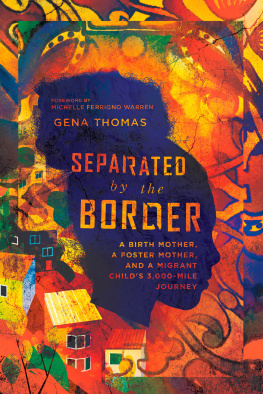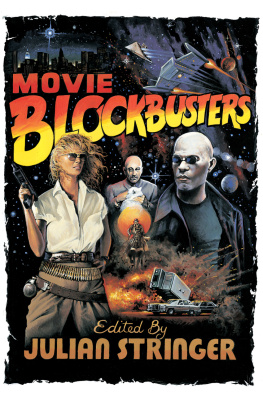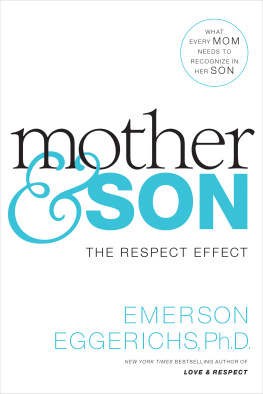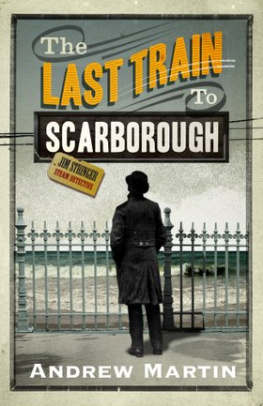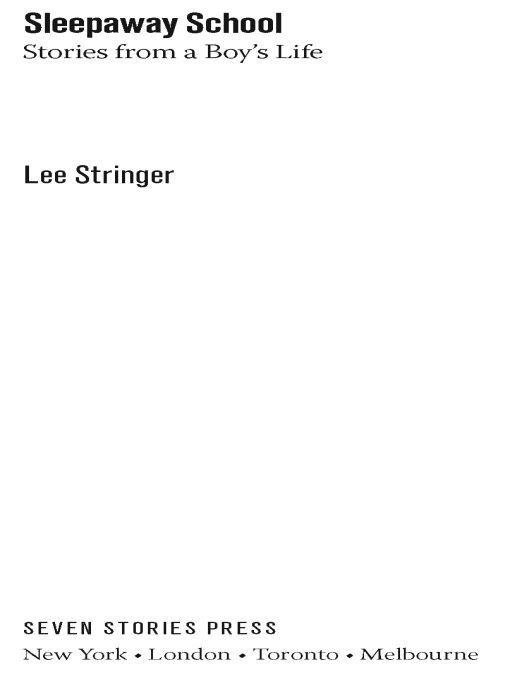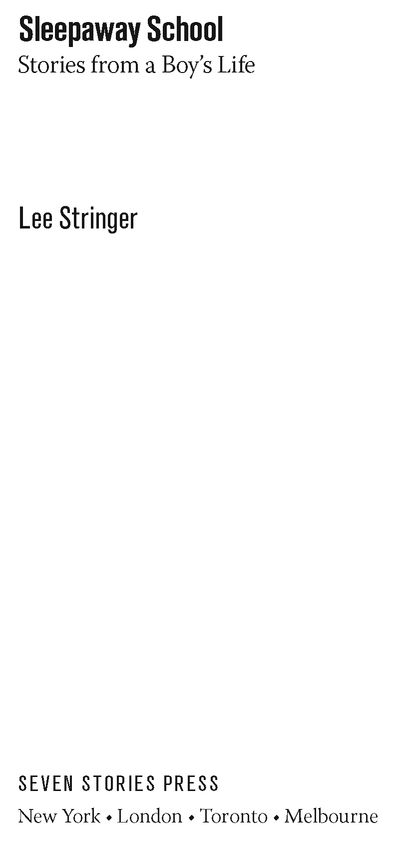Table of Contents
For my mother, Elizabeth Phoebe Treadwell
Foreword
This all really happened to the author, and so must be called a memoir rather than a work of fiction. And the real life so described is still going on. The memoirist Lee Stringer, baptismal first name Caverly, is at the time of its publication one hell of a good writer, and only fifty-four. This is his second book, the first, the huge critical success Grand Central Winter (1998), having been about the adventures of his American soul while riding around inside the body of a crack addict in New York City, listening with the addicts ears, looking out through the addicts eyes.
In this new one, the soul of the writer-to-be is riding around inside the body of an always fatherless, occasionally violent, African-American adolescent whose mother is on welfare. He has been living with his mother and brother and going to public school in a mostly white and prosperous suburb of New York City.
And the author still lives in that suburb, his hometown after all. Yes, and I have just spoken to him on the telephone. We have been friends ever since I was so publicly wowed by his first memoir. And I told him that he had achieved universality with Sleepaway School, despite how strikingly particular the details of his life had been. He had done it, I said, by writing what Germans call a Bildungsroman. I spelled it for him and explained that a tale so-named is about the education and physical development of a human being during the very few years in which he or she stops being a child and becomes an adult.
Some miracle! What a glorious and perfectly awful and universal ordeal!
In Sleepaway School, a boy becomes a man. The way Lee Stringer tells it, that is by itself more than enough for an enthralling story. Never mind which boy, never mind the milieu, although the boy and the milieu can in their own right be called really something.
Kurt Vonnegut
New York City
February 27, 2004
Preface
Somewhere in there, not long after I had gotten my kids legs under me and had begun to walk myself to and fro, it was determined by those who are charged with knowing such things that I was what we today would call a child at risk. It was an unsettling thingseeing such concern etched upon so many grownup faces. And it had the rude effect of acquainting me, far, far too soon, with doubt. But they were right. We wee people were all at risk. Every mothers son of us. Even those of us with overflowing larders and soft, warm beds. Our young hearts like leaves in the wind, we all had to face down the inner turmoil of being, simply, children. We were all on shaky ground.
Three fatherless sons walking down Palmer Avenue, avoiding the cracks in the pavement. Skipping ahead to kick at small stones. The year is 1961. We head for the big empty lot across the street from my house. For ten magical days every other year, this is the staging ground of the Clyde Beatty Circus. Ten days of horse dung and cotton candy flavoring the air. Ten nights of barkers and hurdy-gurdy music to put me off to sleep and color my dreamsall of it practically right outside my window.
This summer its the off year, but weve found our fun on the lot nonetheless. We took Okinawa there in a brave and glorious charge one sunny afternoon. Our dry, mud-clump grenades exploding splendidly against the rocks and trees. The same tall maples from whose high branches we swung like monkeys and thumped our chests and screamed ourselves hoarse one Saturday. After watching a Tarzan double-bill matinee at the Playhouse Theater, I got so carried away I lost my footing and took a hard plunge. A good twenty feet to the ground, too. Such is the magic of summer, though, I didnt hit a single branch.
Another day we ventured to the lots farther reaches. On the other side of the railroad tracks we stumbled across a hidden rubbish heap upon which marvelous toys once owned by children of better fortune were prematurely laid to rest. I dug a perfectly good Remco wind-up arcade game out of the rubble and spent hours of alone time with the thing. Belly-down in the yard, one eye cocked down the sight of its plastic BB gun, picking one tin duck after another off the rotating wheel. Michael found himself a toy fire truck. It was missing a front tire, but the water pump and hose still worked, just like the real thing. I dont remember what Chuck found. If anything.
Michael and Chuck are the only friends I have made since my mother moved my brother and me here from the Bronx five years ago. I remember stepping off the train when we arrived and glimpsing down from the platform at the sleepy, untroubled little town below, how it felt a little like we were immigrants, like we had landed in America for the first timethe tidy, three-story, back-roads America that beams out from the pages of so many picture magazines, down whose tree-lined, picket-fenced, small-town streets so many Hollywood movie cameras have lovingly crawled, the Norman Rockwell, Frank Capra America. In which the pursuit of happiness is a most sacred thing. And indeed I felt that nothing but happiness would follow.
Once I started at school, though, and began rubbing shoulders with other peoples sons and daughters, the feeling soon lost its blush. It was different back in the Bronx, where I went to kindergarten. My teacher was always going on about how well I got along with the other kids. I certainly didnt know why anyone wouldnt be good at this. What else was there for a kid but to make new friends? Walking up to someone new and saying, Hi, my name is so and so, whats yours? was like a fresh adventure each time. Next thing you knew youd made a new friend and the world was that much bigger.
The kids here, though, are not as open as all that. Walk up and say whats your name and it seems to throw them. They cant wait to shrink away and be rid of you. At least thats the way its been for me. Not so much a landing, anymore. More like we have invaded or intruded upon something thats already complete and satisfied without need nor room nor inclination for further variation.
I met Michael first. His house was right next door to mine. Hidden from the street by a stand of hedges nearly eight feet tall. It was a tiny place. A former hot dog stand I have been told. There was barely room enough inside for him and his mother. He was standing at the head of his gravel driveway. Not waiting or looking for anyone. Just perfectly content, it seemed, to stand in one spot. I introduced myself. Told him I had just moved next door. And we kicked around for a while in the huge lumber lot that was his back yard. It was great. I scurried home afterwards. Told my mother in a breathless gush about having made a new friend.
Is he chocolate or vanilla? she wanted to know.
I told her Chocolate, when I caught her drift.
She smiled and said, Thats nice.
Michael and I were at the school playground one Saturday spinning ourselves nauseous on the merry-go-round when we spotted Chuck moping down the way. There was something so lonesome about him I thought nothing of calling him over to play with us. My mothers eyes went wide this time, when I answered that this new friend was vanilla.
I betcha they got money, she said.
We take the long route. Walk to the light at the corner first, having been endlessly cautioned against crossing in the middle of the block. Palmer Avenue is a pretty busy street for a small town like Mamaroneck. It can be dangerous at times. Two years ago, when I was nine, I got hit by a car for crossing it at the wrong place. Me and my brother, Wayne, had just peeked into an ambulance parked up the block. It was Waynes idea. I dont really like ambulances. They strike me as death wagons. But Wayne has a quiet kind of curiosity that sends him suddenly to this place or that. So I went along.


